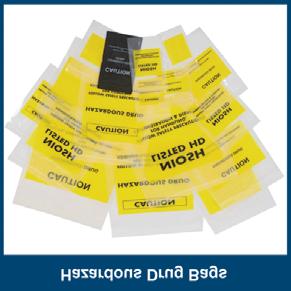
4 minute read
Profile Series: Why Addiction Treatment Should be Standard
HOW THE MINNESOTA DEPARTMENT OF CORRECTIONS HAS REDUCED RECIDIVISM BY TREATING BOTH CRIMINAL AND ADDICTIVE THINKING.
Why Addiction Treatment Should Be Standard for Inmates
Advertisement
Addiction affects the majority of inmates. In the United States, 65% of inmates meet the DSM-IV criteria for substance use disorder, according to a 2010 report by CASAColumbia. However, state agencies like the Minnesota Department of Corrections report that number to be as high as 90%.
Unfortunately, this widespread disease is often overlooked. CASAColumbia says only 11% of inmates with a substance use disorder receive the treatment they need.
Due to the strong link between substance use disorder and crime, offenders who have not received treatment often relapse upon release—into drug use as well as criminal behavior—and reenter the justice system within 12 months. Lack of treatment ultimately fuels the revolving doors of our correctional facilities, contributing to the rising costs of corrections throughout our country.
Evidence-based treatment reduces recidivism
Substance use disorder treatment is shown to reduce recidivism—even when entered involuntarily, according to the National Institutes of Health’s Addiction and the Criminal Justice System fact sheet. Forced abstinence during incarceration does not yield the same results.
For decades, the Minnesota Department of Corrections has been providing addiction treatment to inmates at all custody levels except maximum. Treatment capacity has been expanded to over 1,000 beds in recent years. The department’s program uses evidence-based practices, including cognitivebehavioral therapy (CBT), to avert unhealthy thoughts and behaviors.
The Minnesota Department of Corrections conducted and published a comprehensive study on the outcomes of the department’s treatment programs on inmates
mented the curriculum and followed up with participants six months after completing the program. According to the Iowa Consortium for Substance Abuse Research and Evaluation’s 2012 Jail-based Substance Abuse Treatment Program: Final Outcome Evaluation Report, 93% of the participants who successfully completed A New Direction were abstinent from drug use and 96% had not been arrested.
These results are significant considering the Bureau of Justice Statistics reported in 2014 that 77% of prisoners released in 2005 were rearrested within five years, with 29% of prisoners being arrested within the first six months of release.
with a substance use disorder.
The results in the department’s 2010 Prisonbased Chemical Dependency Treatment in Minnesota Outcome Evaluation show program participation reduced all three recidivism measures: rearrest, reconviction, and reincarceration for a new offense. The research also concluded that longer treatment programs were not always more effective.
Three-month and six-month programs demonstrated better results than programs shorter than 90 days or longer than 12 months.
Ultimately, the evaluation found successful completion of the substance use disorder program reduced recidivism by 23%.
Several other facilities have adopted the Minnesota Department of Corrections’ treatment model, known as A New Direction, and documented successes with the program.
The Iowa Department of Public Health imple

Providing treatment saves money
In addition to slowing the revolving doors of U.S. prisons and jails, providing substance use disorder treatment also reduces societal costs.
The National Drug Intelligence Center estimated the U.S. spent $113 billion on drug-related crime, including criminal justice system costs, in 2007. According to the study Cost-Effectiveness of Connecticut’s In-Prison Substance Abuse Treatment, every dollar spent on prison-based treatment programs saves the public $2 to $6 due to reduced criminal behavior and reincarceration

More information about the Minnesota Department of Corrections model, A New Direction, is available at Hazelden.org/AND. A New Direction curriculum is available for purchase through Hazelden Publishing.

Clearly identifying medications requiring special handling, such as those covered by USP <800>, is important for the safety of your staff and your patients. Available in 4 sizes and 2 thickness, these bags are latex free, manufactured from high quality low-density polyethylene, are economically priced and are ready for immediate shipment.
www.MediDose.com.
COMPLETE EYEGLASSES $14.95
RX Eyeglasses On-Site Optometry On-Site Ophthalmology Testing

1000 Facilities Nationwide 44 States - Federal in all 50 States Correctional Vision Care Since 1983 JonesZylon is introducing a new meal delivery system. The meal tray is a 5- compartment self-stacking tray that seals off each compartment and has underside compartment height to keep food from getting on bottom. The trays are paired with small, medium or large heavy duty corrections grade carts that fit a surprisingly large number of trays. Long lasting casters. Can add a heat box right away or add one later to convert to a heated cart if you have temperature issues.
For more info visit https://www.joneszylon.com/ ServeSmart/ For a video to explain visit https://www.joneszylon.com/Media/ JonesZylon-ServeSmartProducts.mp4



Institutional Eye Care LLC website: institutionaleyecare.com email: info@ institutionaleyecare.com
RapidPak ®
3-in-1 Dissolvable Paks Saves Time and Money
RapidPak is a 3-in-1 dissolvble pak that contains an individual portion of shower, shampoo and shave formula. The outer layer of a RapidPak single-use pak dissolves in water, leaving no waste behind, plus the paks make distribution quick and efficient quick and efficient.
Flexible Silicone Bowl Keeps Officers and Inmates Safe
FDA-Approved Silicone Bowl retains its original shape if bent, twisted, or stepped on. Cannot be crushed or melted down and turned into other shapes. Designed for maximum single-serving capacity and stacks together without sticking.
Jennifer Kapinos Assistant Publisher Corrections Forum • Courts Today

1-800-334-9880 www.bobbarker.com










